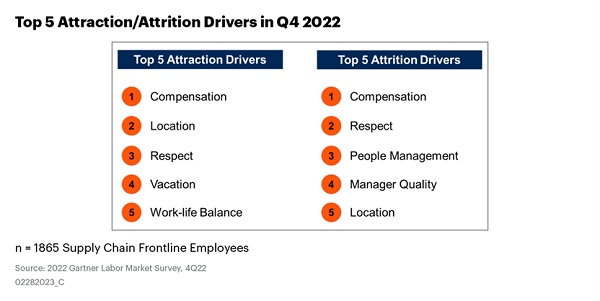The supply chain talent shortage that has been with us for more than a decade grew and intensified into a crisis in recent years, and, today, it shows no sign of letting up. Chief supply chain officers (CSCOs) are acutely aware of the challenges that exist with recruitment and retention and impact being felt across their organization.
According to Gartner research, more than half of all supply chain organizations surveyed indicate that an inability to access talent has interrupted or curtailed business activities in their organizations during the past year. Similarly, when asked in late 2022 about their perception of the labor market, nearly 70% of CSCOs surveyed said that it will remain tight over the coming years and retention will be a significant challenge.
We have identified three key supply chain talent trends that will potentially impact CSCOs abilities to achieve their objectives this year. Managing these talent trends are strategic imperatives at a time when labor shortages continue to challenge supply chain operations.
1) Concerns about the economy and job availability are top of mind
While in 2021 supply chain employees had a strong economic outlook, their optimism about general economic conditions and the economic future of their function declined in 2022 to the lowest point in the last four years. Only 43.3% of supply chain employees displayed somewhat-high to high confidence in the economic future. Job optimism also started a downward shift late last year.
While employee perceptions of job availability are not as low as they were in 2021, the decline in the last quarter of 2022 reflects supply chain employee concerns about a potential economic slowdown and the implications of layoffs, particularly in the tech sector. Supply chain leaders must continue to focus their talent strategies on improving workforce engagement and providing a human-centric work environment where employee needs are met.
2) Frontline workers want investments in well-being, flexibility
Since the supply chain workforce’s perception of job availability has declined in recent months, it’s not surprising that the percentage of employees who are actively seeking jobs has dropped to 19.6%. That’s a decrease of 6% from the previous quarter, after a steady increase throughout 2022.
While this indicates retention has improved, two measures that declined and are causes for concern are discretionary effort - an indicator of an employee’s willingness to go above and beyond - and intent to stay. The rapid decline of these two measures in Q4 2022 require supply chain leaders to redouble their efforts on employee engagement to ensure continued productivity and better business and employee outcomes.
Supply chain organizations will have to build a human-centric work orientation that centers on the individual as the stable pillar to meet employee expectations. To do so, supply chain organizations must prioritize flexible work experiences, enable intentional collaboration and drive empathy-based management.
3) Respect In the workplace will improve retention
Supply chain organizations are increasingly investing in employee experience and employee value proposition. Employee value proposition (EVP) is the set of attributes perceived by the labor market and employees as the value they gain through employment by the organization.
While compensation is the top EVP driver for attraction and attrition of the supply chain workforce, respect deserves attention as a critical driver of attraction and retention for frontline staff as is shown below.

Frontline employees seek a fair degree of respect from their organizations and want those organizations to invest in their personal growth. In fact, a recent Gartner survey on frontline worker experience reveals that more than 85% of frontline supply chain employees say it is important for their organization to see them as a person, not just as an employee. Yet only 33% feel that it is easy to find an organization that sees them this way.
Supply chain organizations that evolve their EVP to a more human deal will have a competitive advantage. A human deal focuses not just on the frontline worker, but on the whole person; not just on experience at work, but on experience in life; not just on features to provide, but on feelings to inspire.
As supply chains continue to operate amid looming economic uncertainty, it’s critical for CSCOs to turn their attention inward. By gaining an understanding of how these three considerations are impacting their organization, leaders can put strategies in place to address concerns and improve workforce performance.
Veena Variyam, is a Vice President, Quantitative Analytics & Digital Innovation for Gartner’s Supply Chain Practice. She leads a global team of quantitative researchers and product managers who deliver data-based insights and digital solutions to address key priorities of supply chain leaders on a wide range of topics including talent management, supply chain strategy and digital transformation. She can be reached at: [email protected]
SC
MR


Latest Supply Chain News
- Few executives believe their supply chains can respond quickly to disruptions
- Technology’s role in mending supply chain fragility after recent disruptions
- Tech investments bring revenue increases, survey finds
- Survey reveals strategies for addressing supply chain, logistics labor shortages
- Israel, Ukraine aid package to increase pressure on aerospace and defense supply chains
- More News
Latest Podcast

 Explore
Explore
Topics
Latest Supply Chain News
- Few executives believe their supply chains can respond quickly to disruptions
- Technology’s role in mending supply chain fragility after recent disruptions
- Tech investments bring revenue increases, survey finds
- Survey reveals strategies for addressing supply chain, logistics labor shortages
- Israel, Ukraine aid package to increase pressure on aerospace and defense supply chains
- How CPG brands can deliver on supplier diversity promises
- More latest news
Latest Resources

Subscribe

Supply Chain Management Review delivers the best industry content.

Editors’ Picks





